Party members 'pioneers' in outbreak battle
Anti-CPC forces use emergency to smear China’s political system
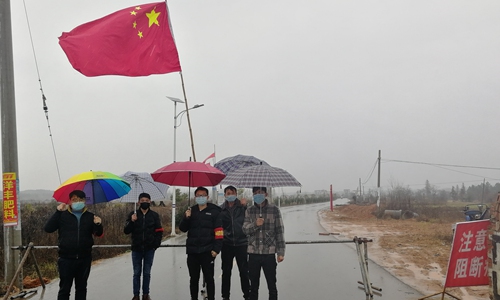
Shangrao in East China's Jiangxi Province sent out nearly 12,000 grid members in the streets and lanes, carrying out education for epidemic prevention, keeping track of residents and preventing gatherings of large crowds. Photo: Courtesy of local official
During the difficult fight against the novel coronavirus pneumonia (NCP), some foreign forces have constantly tried to find and exaggerate the mistakes and imperfections of the Chinese political system and attempted to portray the crisis as a failure of the Communist Party of China (CPC).
But in fact, the CPC is leading the country in every aspect, including the fight against the NCP. Dr. Li Wenliang, who died of the virus and mourned by the Chinese public due to his brave warning of the outbreak early on, is also one of the numerous Party members, most of whom are continuing to fight on the frontline in this tough campaign.
Some anti-China and anti-CPC forces within and outside the country are still exploiting Li and trying to distort him as a 'dissident' who challenged the Chinese political system or a doctor who was persecuted only because he sent early warnings via his social media account.
On some Hong Kong social media networks frequently used by Hong Kong anti-government rioters, some antagonists used Li's picture to design anti-CPC propaganda posts and even blurred out his CPC emblem pinned on his white medical gown, but dare not remind their readers that Li is also a member of the CPC.
Using Li's death to serve an anti-CPC political agenda has had some effects on China's internet, but is generally useless, as most rational Chinese people can judge that the misconduct of some officials who reprimanded Li cannot represent the whole Party, and the immediate decision of the Party to send a supervisory team to Wuhan to investigate the issues related to Li was a response to the anger of the Chinese public, said Chinese analysts.
Zhang Weiwei, a professor and director of the China Institute of Fudan University in Shanghai, told the Global Times that actually in January, the Party at the central level had already learned that the eight doctors including Li Wenliang should not have been reprimanded, meaning that the misconduct was taking place at the local level.
The Supreme People's Court already published an article on its official WeChat public account on January 28 to explain the whole issue of "spreading rumors" on the virus outbreak in Wuhan early on, as well as what the eight "whistleblowers" including Li had done.
The article noted that these "whistleblowers" were wrong as they misidentified the NCP as SARS, but if people in Wuhan had been warned effectively early on to at least wear masks and stay at home, the situation today would be much better, said the article.
As these people did not intend to make trouble and the information they spread was mostly based on facts, and could have even brought positive consequences, law enforcement should be tolerant, the article noted.
Zhang noted that according to the information reflected by the social network platforms and media reports, the people can tell who is doing their job and who isn't, and mentioned three names: Zhong Nanshan, Zhang Hongwen and Yao Gaoyuan, who are all Party members.
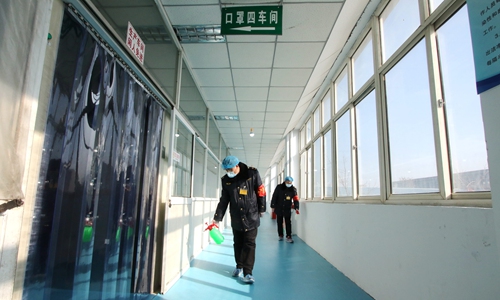
Volunteers who are also members of the Communist Party of China spray disinfectant on mask production companies on Monday in an industrial park in Handan, North China's Hebei Province, to help local companies resume work while preventing the virus spreading amid the outbreak. Photo: cnsphoto
Chinese respiratory scientist Zhong Nanshan is playing a leading role in this fight as he did in the previous fight against SARS in 2003, and is widely respected and trusted by the public. Most Chinese people, even those who are not very educated, take his words as a guidance during this whole outbreak.
Doctor Zhang Hongwen of Huashan Hospital under Fudan University of Shanghai ordered all Party members under his management to replace other personnel in the frontline posts and frequently educated people with professional knowledge on preventing NCP during interviews with the media. Videos about him on Douyin, a short video sharing social network in China, have received more than 90 million views.
Yao Gaoyuan, mayor of Wenzhou, Eastern China's Zhejiang Province, impressed the public with his professional response to media questions using very detailed and clear information without referring to notes. Wenzhou under his leadership also did a good job in preventing and controlling NCP.
Frontline warriors
Li is not the only doctor and Party member who died in the fight against the NCP, and according to incomplete statistics online and reported by the media, apart from the patients, most casualties since the beginning of the fight have been Party members, including doctors, police officers and grass-roots officials. Most of them died because of overwork or from being infected by NCP while treating patients.
In the fight against NCP, as always, when a huge crisis occurs, such as a massive natural disaster like the Wenchuan Earthquake in 2008 or an accident like the Tianjin Blast of 2015, the most dangerous missions and heaviest pressure always land on Party members first, Global Times reporters learned from different cases across the country.
Min Songlin, a 40-year-old Party member and father of a four-month-old baby, works in a leading hospital in East China's Fujian Province. He decided to stay in his hometown of Huanggang to join the fight during the Lunar New Year festival, when he was supposed to be reunited with his family, the first time in four years.
Huanggang, a city neighboring epicenter Wuhan in Central China's Hubei Province, has recorded a significant increase of confirmed coronavirus cases. The confirmed infection cases reached 2,041 as of Saturday (to be updated), following Wuhan.
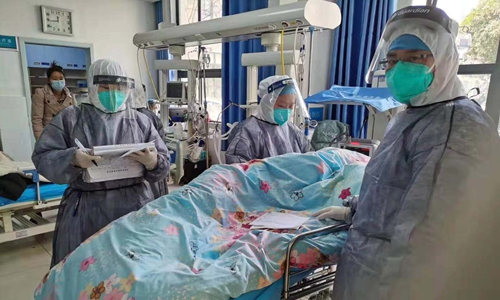
Min Songlin (right) Photo: Courtesy of Min Songlin
Working in the frontline - the emergency department - Min has to wear protective clothing from 8 am to 8 pm without time to go to the toilet or drink water. For the past week, he has not gone back home and has been immersed in the selection, checking and confirmation of patients.
The situation of the patients in his department is more complicated, as the flow of people is large. Not only does he have to treat pneumonia patients infected by the novel coronavirus, but also has to take into account other patients in critical conditions, such as those with cerebral hemorrhage, respiratory failure, heart failure, and multiple injuries.
Min said he does not know how long this battle will last, but he is fully prepared.
"I am a doctor, more importantly, I am a Party member," Min told the Global Times on Friday. "I must first listen to the Party's call and obey the Party's arrangement. So I'm going to fight until the end and that's what I'm supposed to do."
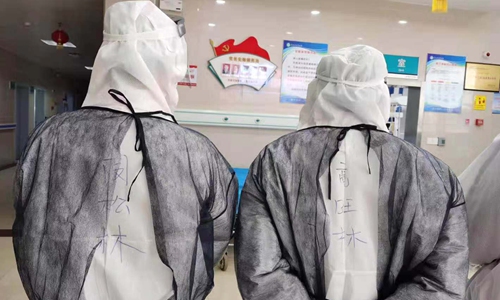
Min Songlin (left) Photo: Courtesy of Min Songlin
Xia Shiwei, a grass-roots local official in Poyang county, East China's Jiangxi Province, is also a Party member who joined the campaign to fight against the coronavirus outbreak on January 27, the third day of the 2020 Lunar New Year.
Poyang, the most populous county in Jiangxi, only had one confirmed case by February 1, but experienced a dramatic rise during the past few days and reported 48 confirmed cases as of the end of Sunday, which triggered increasing anxiety among local residents, some of them told the Global Times.
The local Party branch requested their members be the first to join the campaign, which lasts around the clock, Xia said. Their daily routines involve going door to door to publicize virus control and prevention measures and requirements for every household in their administration areas at least twice a day, stopping residents from gathering together to chat, playing mahjong or dining, helping clarify rumors about the epidemic, stopping people from outside entering Poyang, and closely monitoring residents who have returned from Hubei Province where the virus originated and discouraging them from going outside, Xia noted.
Xia said he was impressed that his fellow Party members and activists for joining the Party actively volunteered to join the campaign and donated daily living materials and medical masks to residents under quarantine.
Xia also donated a total of 500 yuan ($72) recently from his monthly salary of 4,000 yuan.
"As the county is still troubled by a shortage of medical materials, Party members working on the front-line of the campaign do not have enough face masks and some have to wear the same mask for several days because they don't have new one," Xia said.
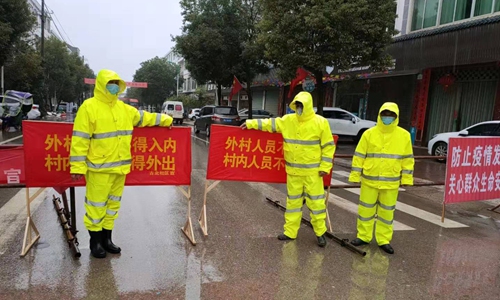
Shangrao in East China's Jiangxi Province sent out nearly 12,000 grid members in the streets and lanes, carrying out education for epidemic prevention, keeping track of residents and preventing gatherings of large crowds. Photo: Courtesy of local official
A Party member should act as a pioneer instead of a hands-off leader in the campaign, a wise man who has a clear and actual understanding of the epidemic and dispels rumors for the public, a cultivator who never tires of repeatedly educating residents on how to protect themselves, Xia noted.
Zhang Cheng is a TV program director at China Central Television (CCTV). He just spent his 35th birthday in Wuhan. Before the Spring Festival holiday, when the nationwide fight against NCP had not fully started, he went back to his hometown of Wuhan to get together with his family, but the situation changed rapidly and the fight against the coronavirus quickly went beyond Wuhan to the whole of the country. Zhang quickly ended his holiday and began to devote himself to reporting the outbreak. As a media professional, he felt fortunate to be able to work at the frontline of this battle.
Since January 23, he has been doing interviews in Wuhan's hospitals and residential communities, where he was exposed to higher risk of infection. To avoid being infected, he wore masks and goggles. Given the shortage of medical materials, he and his colleagues did not often wear protective suits, and chose to work at venues outside wards.
"When work needs me, I cannot think too much, but devote myself to work as soon as possible," said Zhang Cheng, adding that he would try to protect himself as much as possible.
Zhang Cheng said he is an "old" Party member, as he joined the Party in college. What impressed him most was the motto that a Party member must play a pioneer role, Zhang Cheng said.
"That's why I keep working here and try to give the audience a true picture of what's happening in Wuhan," Zhang Cheng told the Global Times.
Zhang Cheng has mixed feelings to share and said there are many touching stories he is eager to explore. His affection toward the city and the country only gets stronger as a frontline participant in a battle, Zhang Cheng said.
"I know many Western reporters view this fight through a biased lens, and my only suggestion to them is to come to China to see for themselves," Zhang Cheng said.
CPC's role
Western ideologists have created a stereotype of the CPC as a outdated, bureaucratic and corrupt political force, but they always failed to explain why China has been able to overcome so many crises and challenges, Chinese experts noted.
In past decades, almost every pessimistic prediction from the Western world about China has eventually turned out wrong, and one key reason is that the West still doesn't understand what the CPC is, Zhang Weiwei said.
"The political parties in the Western world always represent the interests of specific groups rather than the general interests of the overall people and nation like the CPC, so it would be very hard for them to learn what the CPC is," Zhang Weiwei noted.
The CPC combines the advanced people and elites from every circle in society, and the more than 90 million Party members in the nation are a significant leading power making up a massive body that is active and vibrant, so that it is able to push the country to move on in every aspect, whether in normal times or special situations, said Su Wei, a professor at the Party School of the CPC Chongqing Municipal Committee.
The Party has experienced many tough situations and challenges, and has also made some mistakes since its founding in 1921, and most of them have been much more serious and dangerous than the fight against the NCP, Su noted. "But the Party has a strong capability of self-correction and can always make correct decisions and march on the right path at the critical time."
So it would be really na?ve for foreign forces to expect the NCP to turn the situation into a huge crisis that can shake the governance and leadership of the CPC in China, said Chinese experts.